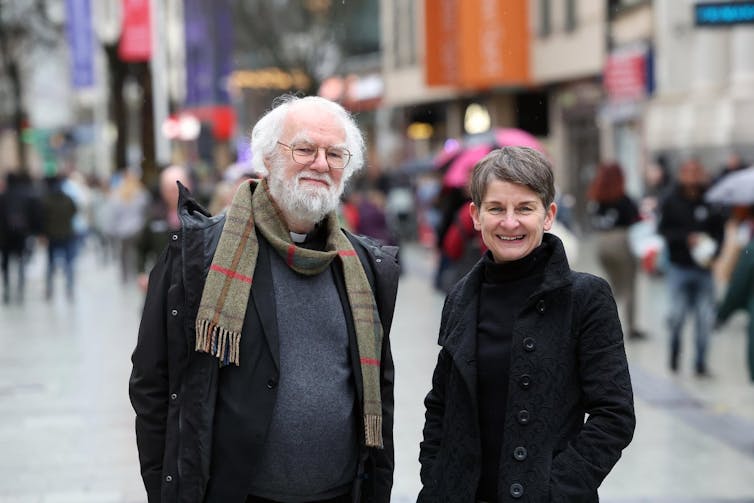A set up to consider the constitutional future of Wales has published its . The Independent Commission on the Constitutional Future of Wales, co-chaired by former Archbishop of Canterbury Dr Rowan Williams and Cardiff Universityâs Professor Laura McAllister, maps three different âviableâ options.
First, they suggest âenhancingâ devolution. This would see Wales operating similarly to how it does now, only with more powers for justice and policing, financial management and rail services. This option also proposes greater cooperation between Cardiff and London on energy and broadcasting.
Second, it suggests Wales joins a federalised UK system. This often draws comparisons to the . But the key feature here is granting Wales guaranteed legal rights and defined areas of responsibility, while the UK government handles broader matters like national security and international treaties.
Finally, it suggests a Wales which is fully independent from the UK.
While the commission finds all of the options to be possible, with advantages and disadvantages, it does not recommend one as the âcorrectâ outcome. Instead it finds that there needs to be a constructive and evidence-based debate which engages Welsh citizens, so that an informed choice can be made.

The Welsh government the commission in 2021. It was set up to ensure Wales is ready for any radical changes in the union, such as Scottish independence, for example. The panel included people from the four main political parties, various organisations and also surveyed the Welsh public.
Criticising the status quo
The report maps the deficiencies in the current devolution settlement. It identifies how the fall-out from Brexit has exposed the fragility of devolution, through Westminster disregarding the . This states the UK parliament will ânot normallyâ pass a law which is within the remit of the devolved legislature without the of the devolved institution. However, the convention is not legally enforceable.
Since the , the report points out that the Sewel convention has been overridden on 11 occasions with virtually no scrutiny in Westminster. It finds that devolution is at risk of gradual attrition if steps are not taken to add legal enforcement to the current convention system.
In their , published in December 2022, the commission found that the status quo is neither viable for the stability nor prosperity of Wales. However, in the the language surrounding this was revised slightly to reflect citizens having a choice to choose âno changeâ.
The language used by Professor McAllister at the Senedd report launch, however, was more critical. She expressed disappointment with the quality of evidence from those who should have been in a position to defend the status quo.
Communication and engagement
Part of the commissionâs work included surveying Welsh citizens. The report finds people in Wales are often unsure about who makes the decisions on different issues. Some people mistakenly believe areas like policing and broadcasting are already devolved to the Welsh government, while others incorrectly identified the UK government as being responsible for health.
The report offered insights as to why this may be the case. This includes an absence of a Welsh perspective on UK affairs in the media. For example, 73% of people agreed they donât see or hear enough about how Wales is run.
Public confusion is another concern. When the UK government steps in on matters already devolved to Wales, citizens struggle to understand which government is calling the shots and on which issues.
It finds that 81% are very or fairly concerned about how Wales is run. But Welsh citizens also lack confidence in their knowledge of the governance of Wales when discussing the constitution in abstract terms. Despite the maturity of Walesâ democratic institutions, the commission finds that devolution does not yet enjoy citizensâ full confidence, and that Welsh democracy therefore needs strengthening. The findings stress the need for more democratic innovation and community engagement that is appropriately resourced.
The commission acknowledges the wider challenges surrounding the current UK environment, particularly in terms of declining trust in political institutions, and the polarisation of debates surrounding Brexit and COVID-19. It acknowledges that many conflate questions about constitutional structure with assessments of the government of the day, and so greater civic engagement is needed.
What next?
stresses that all options are theoretically viable. Which step is pursued is dependent upon the values and risks people are willing to accept.
The report details the harm independence would cause to the Welsh economy in the short to medium term, making it a particularly unattractive option in the current climate. It also states that support for an independent Wales, or indeed the abolition of the Senedd, are in the minority.
Regarding the federal model or Welsh independence, wider UK input would be needed. This is because some of the issues are outside the current .
The option of an enhanced and protected devolution is more achievable, it says. But inter-governmental relations would need to be improved to achieve this. Some 92% of people surveyed believed it was important for governments to work together. The Welsh citizens who were questioned had little time for governments blaming each other, which ultimately feeds disaffection with politics entirely.
The next step must be about moving away from political point scoring and slogans, and widening the national conversation about what could be the best constitutional future for Wales. Politicians in the Senedd and Westminster will set the initial tone but that debate needs to be mature and evidence-based.
The Conversation
This article by Stephen Clear, Lecturer in Constitutional and Administrative Law, and Public Procurement, ŅĮÖÞÉŦ°É, is published under a creative commons licence by The Conversation. Read the.

